- Home
- Al Sarrantonio
The Orangefield Cycle Omnibus
The Orangefield Cycle Omnibus Read online
THE ORANGEFIELD CYCLE OMNIBUS
Horrorween / Hallows Eve / Halloweenland
All Three Novels in One Digital Volume
By Al Sarantonio
A Macabre Ink Collection
Macabre Ink is an imprint of Crossroad Press
Digital Edition published by Crossroad Press
Digital Edition Copyright 2015 / Al Sarrantonio
Cover images courtesy of:
Jeremiah Morelli
LICENSE NOTES
This eBook is licensed for your personal enjoyment only. This eBook may not be re-sold or given away to other people. If you would like to share this book with another person, please purchase an additional copy for each person you share it with. If you’re reading this book and did not purchase it, or it was not purchased for your use only, then you should return to the vendor of your choice and purchase your own copy. Thank you for respecting the hard work of this author.
Meet the Author
Al Sarrantonio is the author of forty-five books. He is a winner of the Bram Stoker Award and has been a finalist for the World Fantasy Award, the British Fantasy Award, the International Horror Guild Award, the Locus Award and the Private Eye Writers of America Shamus Award.
His novels, spanning the horror, science fiction, fantasy, mystery and western genres, include Moonbane, Skeletons, House Haunted, The Five Worlds Trilogy, The Mars Trilogy, West Texas, Orangefield, and Hallows Eve, the last two part of his Halloween cycle of stories.
Hailed as “a master anthologist” by Booklist, he has edited numerous collections, including the highly acclaimed 999: New Stories of Horror and Suspense, Redshift: Extreme Visions of Speculative Fiction, Flights: Extreme Visions of Fantasy, and, most recently, Stories, with co-editor Neil Gaiman, and Halloween: New Poems.
His short stories have appeared in magazines such as Heavy Metal, Twilight Zone, Isaac Asimov’s Science Fiction Magazine, Realms of Fantasy, Analog, and Amazing, as well as in anthologies such as The Year’s Best Horror Stories, Visions of Fantasy: Tales from the Masters, Great Ghost Stories, and The Best of Shadows. His best horror stories have been collected in Toybox, Hornets and Others, and Halloween and Other Seasons.
He has had numerous book club sales, and his work has been translated into more than a dozen languages and appeared in comic book form. He currently lives in New York’s historic Hudson Valley region.
Book List
Campbell Wood
Cold Night
Halloween and Other Stories
Hornets and Others
House Haunted
Kitt Peak
Moonbane
October
Skeletons
Summer Cool
The Boy with Penny Eyes
The Worms
Totentanz
Toybox
West Texas
The Orangefield Series
Horrorween
Hallows Eve
Halloweenland
Orange Lake
The Five Worlds Trilogy
Exile
Journey
Return
The Masters of Mars Trilogy
Haydn of Mars
Sebastian of Mars
Queen of Mars
DISCOVER CROSSROAD PRESS
Visit our online store
Subscribe to our Newsletter
Visit our DIGITAL and AUDIO book blogs for updates and news.
Connect with us on Facebook.
Join our group at Goodreads.
We hope you enjoyed this eBook and will seek out other books published by Crossroad Press. We strive to make our eBooks as free of errors as possible, but on occasion some make it into the final product. If you spot any errors, please contact us at [email protected] and notify us of what you found. We’ll make the necessary corrections and republish the book. We’ll also ensure you get the updated version of the eBook.
If you’d like to be notified of new Crossroad Press titles when they are published, please send an email to [email protected] and ask to be added to our mailing list.
If you have a moment, the author would appreciate you taking the time to leave a review for this book at your favorite online site that permits book reviews. These reviews help books to be more easily noticed.
Thank you for your assistance and your support of the authors published by Crossroad Press.
Author’s Note
For those interested, some other Orangefield tales can be found here:
“Orange Lake,” a novelette, with the bonus story “The Pumpkin Smasher”
“Hornets,” a novella, in my short story collection HORNETS AND OTHERS
“The Pumpkin Boy,” a novella, in my short story collection HALLOWEEN AND OTHER SEASONS
And, other Halloween stories:
“Pumpkin Head,” “The Big House,” “The Spook Man” and “Bogey” in my short story collection TOYBOX
Boo,
—Al Sarrantonio
CONTENTS
Horrorween
Hallows Eve
Halloweenland
HORRORWEEN
Book One of the Orangefield Series
By Al Sarrantonio
A Macabre Ink Novel
Macabre Ink is an imprint of Crossroad Press
Digital Edition published by Crossroad Press
Digital Edition Copyright 2012 / Al Sarrantonio
Copy-edited by: Patricia Lee Macomber
Cover image courtesy of:
Jeremiah Morelli
Foreword
The original name of the town was Orangefield, after a Scottish Earl who was little remembered and therefore expendable. But the locals, by referendum in 1930, changed it to Pumpkinfield in order to make money.
“Hell, it sounds like Halloween!” was the general consensus. It was hoped that with a name like Pumpkinfield folks would come by and, if disappointed at the lack of pumpkins, would at least enjoy the foliage and spend dollars.
The second choice was Little Salem.
They didn’t grow many pumpkins in the region in 1930, but in a bizarre case of the cart leading the horse, and then winning the race, it turned out that the soil was richly perfect and that pumpkins grew in profusion — up hillsides, in the fertile valleys, in straight tended rows, in backyard patches. By the late 1930s the place literally turned orange in late summer, and stayed that way until October 31st.
After that, with so many rotting (and smashed) pumpkins, the town smelled sickly sweet for a week.
Just before World War II, another referendum changed the named back to Orangefield.
It was sometime during this period that strange things began to happen in Orangefield — usually around the time of Halloween. There was the disappearance of the entire Cutler family in 1940, who left behind warm tea and a game of Monopoly in progress. Just after the war there was the murder of Amos Stone by his three children, wearing Halloween masks, aged seven, five, and four, who then went on to murder one another, leaving a knife-induced bloodbath. In 1951 there was the brand-new Sullivan house which went up in flames on its first All Hallows Eve, was rebuilt, and burned down again the following Halloween. And then again. (The plot was left fallow after that.) These and other similar stories are covered in the first two volumes of this history.
There were, and continue to be, many tales of Samhain, the Celtic Lord of Death and master of Halloween, and many so-called ‘Sam Sightings.’ It has been said that Samhain somehow owns Orangefield, had claimed it before man of any kind — native American or Englishman — had laid plough to the land. There occurred, during the writing of this history, the case of Hattie Ivers, and many others, who have claimed direct confrontatio
n with Samhain.
And then there was perhaps the worst thing that ever happened in Orangefield, which concerned in part my own father, as well as the Pumpkin Boy, the children’s book writer Peter Kerlan, the police detective Bill Grant, as well as the three chosen by Samhain himself….
— Thomas Robert Reynolds, Jr.
Occult Practices in Orangefield and Chicawa County, New York, Volume Three
Part One
“Something’s Coming”
Chapter One
Too warm for October.
Staring out through the open door of his house, Peter Kerlan loosened the top two buttons of his flannel shirt, then finished the job, leaving the shirt open to reveal a gray athletic tee-shirt underneath. Across the street the Meyer kids were re-arranging their newly purchased pumpkins on their front stoop — first the bigger of the three on the top step, then the middle step, then the lower. They were jacketless, and the youngest was dressed in shorts. Their lawn was covered, as was Kerlan’s, with brilliantly colored leaves: yellow, orange, a dry brown. The neighborhood trees were mostly shorn, showing the skeleton fingers of their branches; the sky was a sharp deep blue. Everything said Halloween was coming — except for the temperature.
Jeez, it’s almost hot!
Behind him, out through the sliding screen door that led to the back yard, Peter could hear Ginny moving around, making an attempt at early Sunday gardening.
Maybe it’s cold after all.
He opened the front screen door, retrieved the morning newspaper he had come for, and turned back into the house, unfolding the paper as he went.
In the kitchen, he sat down at the breakfast table and studied the front page.
The usual assortment of local mayhem — a robbery, vandalism at the junior high school, a teacher at that same school suspended for drug use.
In the back, Ginny cursed angrily; there was the sound of something being knocked against something else.
“Peter!” she called out.
He pretended not to hear her for a moment, then answered, “I’m eating breakfast!” and began to study the paper much more closely then it deserved.
On the second page, more local mayhem, along with the weather — sunny and unseasonably warm for at least the next three days — as well as a capsule listing of the rest of the news, which he scanned with near boredom.
Something caught his eye, and he gave an involuntary shiver as he turned to the page indicated next to the summary and found the headline:
Hornets Attack Preschoolers
Another shiver caught him as he noted the picture embedded in the story — a man clothed in mosquito netting and a pith helmet holding up the remains of a huge papery nest; one side of the structure was caved in and within he could make out the clumped remains of dead insects —
Again he gave an involuntary shiver, but went on to the story:
(Orangefield, Special to the Herald, Oct. 7) Scores of preschoolers were treated today for stings after a small group of the children inadvertently stirred up a hornets’ nest which had been constructed in a hollow log. The nest, which contained hundreds of angry hornets, was disturbed when a kick ball rolled into it. When one of the children went to retrieve the ball, the insects, according to witnesses, “attacked and kept attacking.”
Twenty eight children in all were treated for stings, and the Klingerman Pre School was closed for the rest of the day.
The nest was removed by local beekeeper Floyd Willims, who said this kind of attack is very common. “The nests are mature this time of year, and can hold up to five hundred drones, along with the Queen. Actually, new drones are maturing all the time, and can do so until well into fall. With the warm weather this year, their season is extended, for another few weeks at least. The first real cold snap will kill them off.”
Willims continued, “Everyone thinks that yellow jackets are bees, but they’re not. They’re hornets, and can get pretty mean when the nest is threatened. At the end of the season, next year’s Queens will leave the nest, and winter in a safe spot, before laying eggs and starting the whole process over again with a new nest.”
As of last night, none of the hornet stings had proved dangerous, and Klingerman Preschool will reopen tomorrow.
Peter finished the story, looked at the picture again — the bee keeper holding the dead nest up with a triumphant grin on his face — and gave a third involuntary shiver.
Ugh.
At that moment Ginny appeared at the back sliding door, staring in through the screen. He looked up at her angry face.
“I can’t get that damned shed door open!” she announced. “Can you help me please?”
“After I finish my breakfast—”
Huffing a breath, she turned and stormed off.
“Aren’t you going to eat with me?” he called after her, hoping she wouldn’t turn around.
She stopped and came back. “Not when you talk to me with that tone in your voice.”
“What tone?” he protested, already knowing that today’s version of ‘the fight’ was coming.
She turned and gave him a stare — her huge dark eyes as flat as stones. She was as beautiful as she had ever been, with her close cropped blonde hair and anything but boyish looks. “Are we going to start again?”
“Only if you want to,” he said.
“I never want to. But I don’t know how much more of this I can take.”
“How much more of what?”
She stalked off, leaving the door open. After a moment, Peter threw down the paper and followed her, closing the sliding screen door behind him and dismounting the steps of the small deck. She was in front of the garden shed, a narrow, four-foot-deep, one story-high structure attached to the house to the right of his basement office window.
“Well, I’m here,” he said, not at all surprised that she momentarily ignored him.
Jeez, it is hot! he thought, looking up at a sun that looked summer-bright, and then surveying the back yard. The colored leaves fallen from the tall oaks that bordered the backyard looked incongruous, theatrical. There was an uncarved pumpkin on the deck of the house behind theirs; it looked out of place in the heat.
Peter turned to stare at Ginny’s little garden, to the right of the shed, which displayed late annuals; they were a riot of summer color which normally would have been gone by this time of year, killed by the first frost which had yet to come.
“I’ve been weeding by hand,” she explained, “but I’d like to get some of the tools out and get ready for next spring. I’ve been having trouble with the shed door again.”
He stepped around her, pulled at the structure’s wooden door, which gave an angry creak but didn’t move.
“Heat’s got the wood expanded; I’ll have a look at it when I get a chance.” He gave it a firmer pull, satisfied that it wouldn’t move.
“Isn’t there anything you can do about it now?”
“No.” He knew he sounded nasty, but didn’t care.
She reddened with anger, then brought herself under control. “Peter, I’m going to try again. We’ve been through this fifty times. You’re punishing me, and there isn’t any reason. I know it’s been rocky between us lately. But I don’t want it to be like that! Can’t you just meet me halfway on this?”
“Halfway to hell?”
She was quiet for a moment. “I love you,” she said, “but I just can’t live like this.”
“Like what?” he answered, angry and frustrated.
“No matter what I do you find something wrong with it — all you do is criticize!”
“I…don’t,” he said, knowing as it came out that it wasn’t true.
She took a tentative step forward, reached out a hand still covered in garden loam. She let the hand fall to her side.
“Look, Peter,” she said slowly, eyes downward. “I know things haven’t been going well for you with your writing, believe me I do. But you can’t take it out on me. It’s just not fair.”
Male p
ride fought with truth. He took a deep breath, looking at her, as beautiful as the day he met her — he was driving her away and didn’t know how to stop.
“I… know I’ve been difficult—” he began.
She laughed. “Difficult? You’ve been a monster. You’ve frozen me out of every corner of your life. We used to talk, Peter; we used to try to work things out together. You’ve gone through these periods before and we’ve always gotten through them together. Now…” She let the last word hang.
He was powerless to tell her how he felt, the incomprehensible frustration and impotence he felt. “It’s like I’m dry inside. Hollow…”
“Peter,” she said, and then she did put a dirt-gloved hand on his arm. “Peter, talk to me.”
He opened his mouth then, wanting it to be like had been when they first met, when he had poured his heart out to her, telling her about the things he had inside that he wanted to get out, the great things he wanted to write about, his ambition, his longings — she had been the only woman he ever met who would listen to it, really listen to it. He had a sixth sense that if he did the wrong thing now it would mean the end, that he had driven her as far away as he dared, and that if he pushed her a half step farther she would not return.
He said, “Why bother?”
Again she reddened with anger, and secretly he was enjoying it.
“I’m going out for the day. We’ll talk about this later.”
“Whatever you say.” He gave her a thin smile.
She turned away angrily, and after a moment he heard the screen door slide shut loudly, the front door slam, and the muted roar of her car as she left.
Why did you do that? he asked himself.
And a moment later he answered: Because I wanted to.
Chapter Two
The computer screen was still blank.
At his desk in his basement office, Kerlan sat staring at the white clean sheet of the word processing program. It was like staring at a clean sheet of paper. Maybe that’s why they settled on that color, so that writer’s block would be consistent in the computer age.

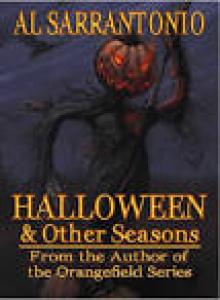 Five World Saga 01 Hornets and Others
Five World Saga 01 Hornets and Others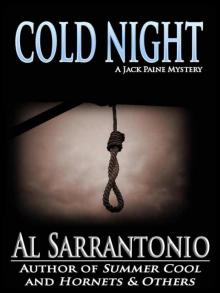 Cold Night (Jack Paine Mysteries)
Cold Night (Jack Paine Mysteries)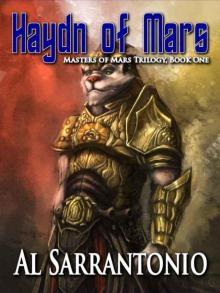 Haydn of Mars
Haydn of Mars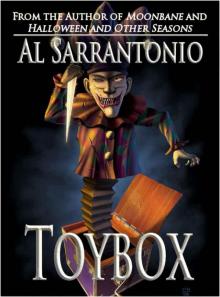 Toybox
Toybox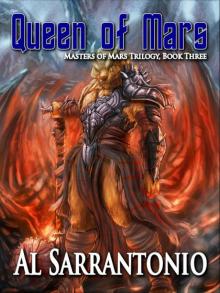 Queen of Mars - Book III in the Masters of Mars Trilogy
Queen of Mars - Book III in the Masters of Mars Trilogy Exile
Exile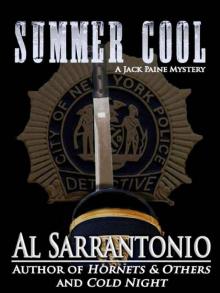 Summer Cool - A Jack Paine Mystery (Jack Paine Mysteries)
Summer Cool - A Jack Paine Mystery (Jack Paine Mysteries) Return - Book III of the Five Worlds Trilogy
Return - Book III of the Five Worlds Trilogy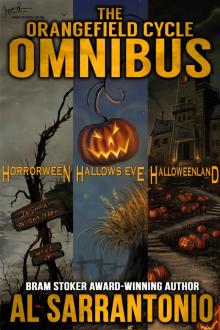 The Orangefield Cycle Omnibus
The Orangefield Cycle Omnibus Summer Cool jp-2
Summer Cool jp-2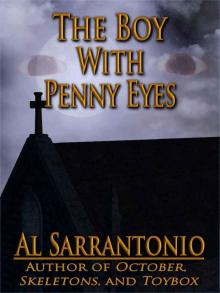 The Boy With Penny Eyes
The Boy With Penny Eyes Journey - Book II of the Five Worlds Trilogy
Journey - Book II of the Five Worlds Trilogy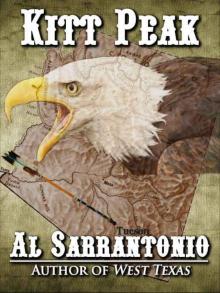 Kitt Peak
Kitt Peak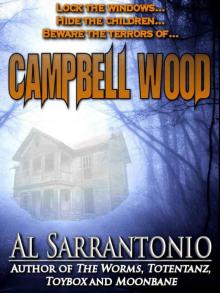 Campbell Wood
Campbell Wood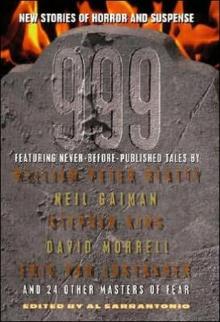 999
999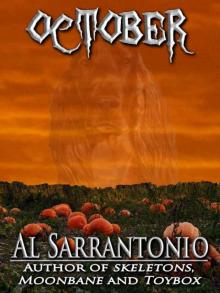 October
October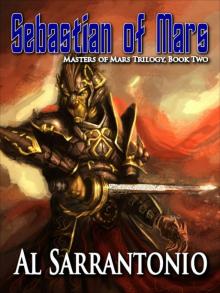 Sebastian of Mars
Sebastian of Mars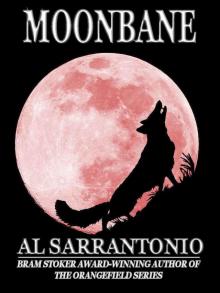 Moonbane
Moonbane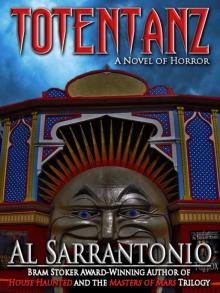 Totentanz
Totentanz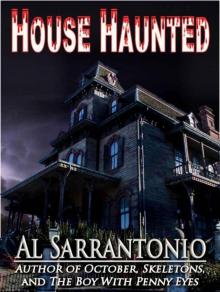 House Haunted
House Haunted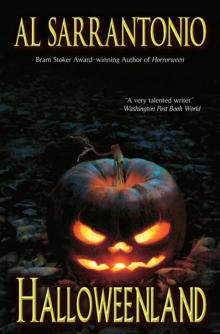 Halloweenland
Halloweenland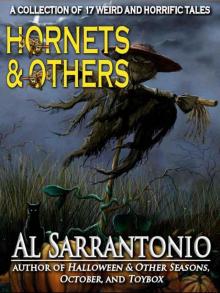 Hornets and Others
Hornets and Others